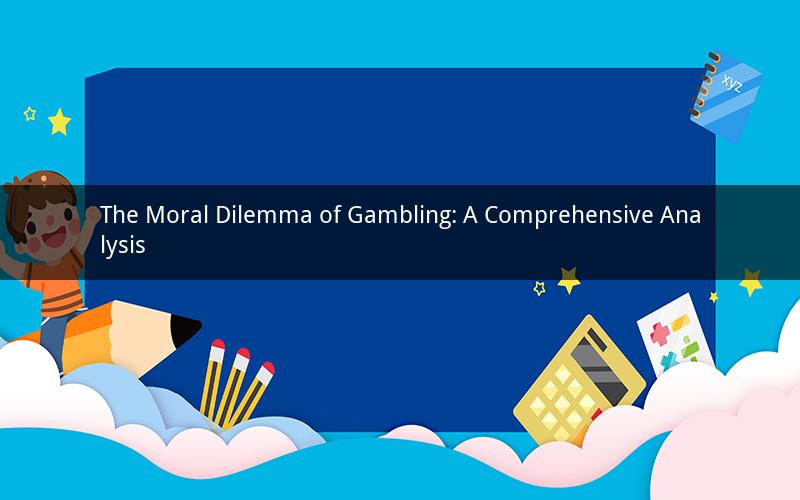
In today's society, gambling has become a widespread phenomenon. It is present in various forms, ranging from lottery tickets and sports betting to online casinos and poker. Despite its popularity, the question of whether gambling is moral remains a contentious issue. This article delves into the moral complexities surrounding gambling, examining its ethical implications and exploring different perspectives.
I. The Ethics of Gambling
The ethics of gambling are multifaceted, encompassing various moral principles and theories. One of the primary ethical concerns is the potential for harm. Gambling can lead to addiction, financial ruin, and even psychological distress. This raises the question of whether it is morally permissible to engage in an activity that can have such devastating consequences.
A. The Harm Principle
The harm principle, proposed by philosopher John Stuart Mill, asserts that individuals should be free to act as they wish, provided that their actions do not harm others. Proponents of this principle argue that gambling is a personal choice, and as long as it does not harm others, it should be morally permissible. However, critics contend that gambling can lead to harm, both to individuals and society as a whole.
B. Utilitarianism and the Greatest Good for the Greatest Number
Utilitarianism is a moral theory that suggests actions are right if they promote the greatest good for the greatest number of people. In the context of gambling, this theory could be interpreted as arguing that, while gambling may cause harm to some individuals, it can also generate significant economic benefits for society. This includes job creation, tax revenue, and entertainment opportunities. However, critics argue that the potential for harm outweighs any potential benefits.
C. The Right to Freedom and Autonomy
Another ethical perspective is that individuals have a right to freedom and autonomy, which includes the freedom to make choices about their own lives. This right extends to the decision to engage in gambling. As long as individuals are aware of the risks and choose to participate voluntarily, their actions should be considered morally permissible.
II. The Religious Perspective on Gambling
Religious beliefs play a significant role in shaping individuals' moral views on gambling. Different religions have varying stances on this issue, reflecting their values and teachings.
A. Christianity
Many Christians believe that gambling is a sin, as it involves the pursuit of wealth through luck rather than hard work. The Bible contains several passages that warn against gambling and the love of money, such as Proverbs 13:11 ("Dishonest money dwindles away, but he who gathers money little by little makes it grow"). However, other Christians argue that gambling can be a form of entertainment, as long as it is done responsibly and without the intention of making a profit.
B. Islam
In Islam, gambling is considered haram, or forbidden. The Quran explicitly prohibits gambling, as it is seen as a form of corruption and a means of obtaining wealth through deceit. Muslims are advised to avoid all forms of gambling, including lottery, betting, and casino games.
C. Judaism
Judaism does not explicitly prohibit gambling, but it does caution against it. The Torah advises against engaging in activities that are likely to lead to harm, such as gambling. Many Jewish traditions encourage individuals to avoid risky behaviors, including gambling, to protect their well-being and the well-being of their families.
III. The Social and Cultural Impact of Gambling
Gambling has a profound impact on society and culture, both positive and negative. Understanding these impacts can provide further insight into the moral complexities of gambling.
A. Economic Benefits
Gambling can generate significant economic benefits for a region or country. This includes job creation, tax revenue, and infrastructure development. Casinos, for example, can become major employers and contribute to the local economy.
B. Social Harms
Gambling can also lead to social harms, such as addiction, crime, and financial distress. Problem gamblers may turn to theft or fraud to fund their addiction, causing harm to themselves and others. Additionally, gambling-related debt can lead to relationship problems, mental health issues, and even suicide.
C. Cultural Considerations
The cultural context in which gambling occurs can also influence its moral implications. In some societies, gambling is deeply ingrained in the culture and may be considered a legitimate form of entertainment. In other societies, gambling is stigmatized and associated with negative consequences.
IV. Conclusion
The moral debate over gambling is complex and multifaceted. While some argue that gambling is a personal choice and should be morally permissible, others contend that its potential for harm outweighs any benefits. The religious perspective adds another layer of complexity, with some religions prohibiting gambling altogether. Ultimately, the question of whether gambling is moral depends on individual beliefs, cultural context, and the values one holds.
Questions:
1. What are the main ethical concerns surrounding gambling?
2. How do religious beliefs influence the moral perspective on gambling?
3. What are the economic benefits and social harms associated with gambling?
4. How does the cultural context impact the moral implications of gambling?
5. How can individuals make responsible decisions regarding gambling?